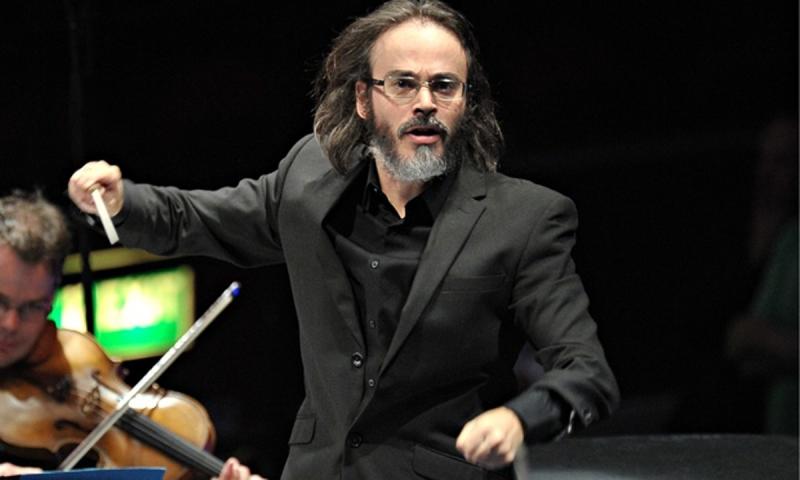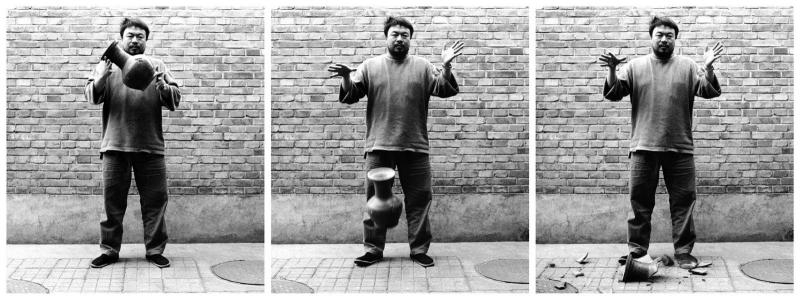BBC Symphony Orchestra, Volkov, Barbican | reviews, news & interviews
BBC Symphony Orchestra, Volkov, Barbican
BBC Symphony Orchestra, Volkov, Barbican
An unlikely but stimulating classical frame for a new work by Richard Ayres

This Barbican concert began with a Mendelssohn overture and ended with a Haydn symphony. But on stage were the BBC Symphony Orchestra and Ilan Volkov. What did you expect in between, a Mozart piano concerto? Not likely. Instead they gave the first performance of No.48 (night studio) by Richard Ayres.
The opening of No.48 was a characteristic Ayres refrain, a frantic merry-go-round of bells and piccolo alternating with earthy brass that brought the 20-minute piece to a yah-boo-sucks anti-closure. In the middle, a pocket primer to good old classical music, structured (if that’s quite the word) by a tape part that’s part German radio announcer, part Beckett radio play. Twenty-second sonatinas, symphonies and concertos come and go, each lugubriously announced (Allegro – Adagio – Scherzo) and punctuated by the click of a door latch, steps, a sigh.
Is No.48 a parody of our attention spans? Or of our tenacious attachment to art-culture and certainties that harden into prejudices? Is the orchestra in the room, misbehaving when our man has popped out? Or is it in his head? Ayres’s music is baffling, and it’s meant to be, but it’s also funny and unnerving, like Beckett, or indeed the art of Philip Guston which Ayres claimed was an inspiration for the piece. Guston was an inveterate lucubrant – hence the subtitle – and No.48 paints a picture in sound of a man alone, with only his thoughts for company. The speed at which it cuts between Austro-German clichés reminds us that we think faster than we listen.
 Listening for the continuity traced in classical narratives would miss the point. We bring different eyes to Rembrandt and Ai Wei Wei. Indeed Ayres and Ai share a weary fascination with the past and the weight of history which is captured by Dropping a Han Dynasty Urn, 1995, presently on display at the Royal Academy (and pictured above). However, Haydn got there first, as he always does. The slow movement of Symphony No.52 is to all intents athematic, no less than Ayres. Stuff happens, then it stops. On paper it looks far easier to play than Ayres’s copiously orchestrated candyfloss, but every phrase needs a direction and commitment that were lacking here. The tigerish ferocity of the first movement had its teeth extracted. The minuet was pretty, and pretty aimless.
Listening for the continuity traced in classical narratives would miss the point. We bring different eyes to Rembrandt and Ai Wei Wei. Indeed Ayres and Ai share a weary fascination with the past and the weight of history which is captured by Dropping a Han Dynasty Urn, 1995, presently on display at the Royal Academy (and pictured above). However, Haydn got there first, as he always does. The slow movement of Symphony No.52 is to all intents athematic, no less than Ayres. Stuff happens, then it stops. On paper it looks far easier to play than Ayres’s copiously orchestrated candyfloss, but every phrase needs a direction and commitment that were lacking here. The tigerish ferocity of the first movement had its teeth extracted. The minuet was pretty, and pretty aimless.
In the Calm Sea and Prosperous Voyage which Mendelssohn wrote as a prototypical tone-poem after Goethe’s texts, the BBCSO made a much more convincing simalcrum of an early 19th-century orchestra than Haydn’s late-18th band, not through unpractised aping of manners such as pure tone and clipped phrasing but the transparency that naturally arises from their expertise in new music. Volkov revealed all the instrumental colours of Mendelssohn’s painterly eye and ear including a naturalistically piercing piccolo breeze and a piping naval trumpet trio to announce safe arrival in port. Beethoven’s vocal-orchestral setting of the same Goethe poems was far more generic, or so it seemed here, and the men of the BBC Singers returned after the interval for more aquatic Goethe – Schubert’s Song of the Spirits upon the Waters. It was, all in all, a typical Volkov programme, lacking polish but more than compensating with music to make you listen afresh.
rating
Share this article
The future of Arts Journalism
You can stop theartsdesk.com closing!
We urgently need financing to survive. Our fundraising drive has thus far raised £49,000 but we need to reach £100,000 or we will be forced to close. Please contribute here: https://gofund.me/c3f6033d
And if you can forward this information to anyone who might assist, we’d be grateful.

Subscribe to theartsdesk.com
Thank you for continuing to read our work on theartsdesk.com. For unlimited access to every article in its entirety, including our archive of more than 15,000 pieces, we're asking for £5 per month or £40 per year. We feel it's a very good deal, and hope you do too.
To take a subscription now simply click here.
And if you're looking for that extra gift for a friend or family member, why not treat them to a theartsdesk.com gift subscription?
more Classical music
 Bizet in 150th anniversary year: rich and rare French offerings from Palazzetto Bru Zane
Specialists in French romantic music unveil a treasure trove both live and on disc
Bizet in 150th anniversary year: rich and rare French offerings from Palazzetto Bru Zane
Specialists in French romantic music unveil a treasure trove both live and on disc
 Scottish Chamber Orchestra, Ibragimova, Queen’s Hall, Edinburgh review - rarities, novelties and drumrolls
A pity the SCO didn't pick a better showcase for a shining guest artist
Scottish Chamber Orchestra, Ibragimova, Queen’s Hall, Edinburgh review - rarities, novelties and drumrolls
A pity the SCO didn't pick a better showcase for a shining guest artist
 Kilsby, Parkes, Sinfonia of London, Wilson, Barbican review - string things zing and sing in expert hands
British masterpieces for strings plus other-worldly tenor and horn - and a muscular rarity
Kilsby, Parkes, Sinfonia of London, Wilson, Barbican review - string things zing and sing in expert hands
British masterpieces for strings plus other-worldly tenor and horn - and a muscular rarity
 From Historical to Hip-Hop, Classically Black Music Festival, Kings Place review - a cluster of impressive stars for the future
From quasi-Mozartian elegance to the gritty humour of a kitchen inspection
From Historical to Hip-Hop, Classically Black Music Festival, Kings Place review - a cluster of impressive stars for the future
From quasi-Mozartian elegance to the gritty humour of a kitchen inspection
 Shibe, LSO, Adès, Barbican review - gaudy and glorious new music alongside serene Sibelius
Adès’s passion makes persuasive case for the music he loves, both new and old
Shibe, LSO, Adès, Barbican review - gaudy and glorious new music alongside serene Sibelius
Adès’s passion makes persuasive case for the music he loves, both new and old
 Anja Mittermüller, Richard Fu, Wigmore Hall review - a glorious hall debut
The Austrian mezzo shines - at the age of 22
Anja Mittermüller, Richard Fu, Wigmore Hall review - a glorious hall debut
The Austrian mezzo shines - at the age of 22
 First Person: clarinettist Oliver Pashley on the new horizons of The Hermes Experiment's latest album
Compositions by members of this unusual quartet feature for the first time
First Person: clarinettist Oliver Pashley on the new horizons of The Hermes Experiment's latest album
Compositions by members of this unusual quartet feature for the first time
 Gesualdo Passione, Les Arts Florissants, Amala Dior Company, Barbican review - inspired collaboration excavates the music's humanity
At times it was like watching an anarchic religious procession
Gesualdo Passione, Les Arts Florissants, Amala Dior Company, Barbican review - inspired collaboration excavates the music's humanity
At times it was like watching an anarchic religious procession
 Classical CDs: Camels, concrete and cabaret
An influential American composer's 90th birthday box, plus British piano concertos and a father-and-son duo
Classical CDs: Camels, concrete and cabaret
An influential American composer's 90th birthday box, plus British piano concertos and a father-and-son duo
 Cockerham, Manchester Camerata, Sheen, Martin Harris Centre, Manchester review - re-enacting the dawn of modernism
Two UK premieres added to three miniatures from a seminal event of January 1914
Cockerham, Manchester Camerata, Sheen, Martin Harris Centre, Manchester review - re-enacting the dawn of modernism
Two UK premieres added to three miniatures from a seminal event of January 1914
 Kempf, Brno Philharmonic, Davies, Bridgewater Hall, Manchester review - European tradition meets American jazz
Bouncing Czechs enjoy their Gershwin and Brubeck alongside Janáček and Dvořák
Kempf, Brno Philharmonic, Davies, Bridgewater Hall, Manchester review - European tradition meets American jazz
Bouncing Czechs enjoy their Gershwin and Brubeck alongside Janáček and Dvořák
 Solomon, OAE, Butt, QEH review - daft Biblical whitewashing with great choruses
Even a top soprano and mezzo can’t make this Handel paean wholly convincing
Solomon, OAE, Butt, QEH review - daft Biblical whitewashing with great choruses
Even a top soprano and mezzo can’t make this Handel paean wholly convincing

Add comment